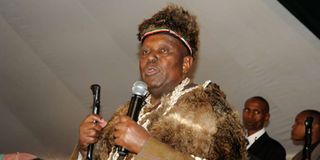Success of a trust lies in trust

Former Kiambu tycoon the late Njenga Karume.
What you need to know:
- A day will not pass before you see a newspaper story on a celebrity inheritance dispute with family members at each other’s neck, fighting over assets of the deceased.
- The Karume case provides revealing lessons on estate planning. If you plan to create a trust, I suggest that you grab a copy of the judgment and study it.
When planning your estate, should you write a will or take the route of appointing a trust? I know I risk being accused of burying my head in the sand, choosing to discuss the mundane when the mood of the moment should be to tackle the most topical issue — the Building Bridges Initiative (BBI).
But we have big problems with mediation of inheritance disputes, especially probate cases involving the rich and famous.
The recent spike in the number of court battles in the dockets of probate cases is, indeed, a sign of the times we live in. Compounding the situation are inordinate delays by courts in handling and concluding probate cases.
A day will not pass before you see a newspaper story on a celebrity inheritance dispute with family members at each other’s neck, fighting over assets of the deceased.
The family of the Jomo Kenyatta-era cabinet minister Mbiyu Koinange, for instance, has been in court since September 1981.
I find inheritance and legal battles touching on the rich and famous endlessly fascinating. You read gripping narratives about hitherto unearthed family secrets and tales of broken and dashed hopes of family members who have lived their lives in anticipation of riches from inheritance.
My entry point into the discussion on mediation of inheritance feuds is the recent resolution of the longstanding feud between the family of the famous former Kiambu tycoon Njenga Karume and the trustees of The Njenga Karume Trust.
Here’s the background to the saga.
Planned his exit
Karume had planned his exit from the world well. He chose a trust rather than a will-based estate plan. As you peruse the trust deed, you discover that he wanted the trust to administer his massive wealth through many generations.
He wanted the trust to cater for the maintenance, education and health of his beneficiarie — ranging from his widow to children, grandchildren and great grandchildren.
Karume also chose the trustees very wisely: High Court judge and current Attorney-General, Paul Kihara Kariuki; former chairman of the Capital Markets Authority, Kung’u Gatabaki; and one of his sons, Wameri Karume. He was the founding chairman of the trust.
But as fate would have it, Karume passed on hardly one year after he created the trust. Justice Kihara, who took over the chairmanship following Karume’s death, resigned three month later.
Hardly two years after Karume’s death, a section of the family rushed to court, complaining about mismanagement of Karume’s assets by the trustees and seeking their removal.
The High Court did remove the trustees and further direct a legal firm, Iseme, Kamau and Waema, to nominate new ones through mediation with the beneficiaries of the trust.
Pundits predicted that nomination of new trustees would set the stage for another explosive dispute.
However, events went contrary to those predictions because the legal firm managed to come up with names that were agreeable to the family. Prominent accountant and insolvency practitioner Kuria Muchiri was appointed chairman of the new board of trustees.
The Karume case provides revealing lessons on estate planning. If you plan to create a trust, I suggest that you grab a copy of the judgment and study it.
We often forget that tycoons are not different from ordinary people when it comes to estate planning. They may have access to the best lawyers, agents and advisers but the issues and complications that come with estate planning are the same for everyone.
As I went through the judgment and other court documents, I was left asking myself the following questions: What skills, experience, domain knowledge and soft skills in mediation techniques, should one insist on when nominating trustees?
Go rogue
What if the trustees you trusted (pun unintended) when you were alive go rogue after you die? What and how much say should the beneficiaries of a trust be given when it comes to decisions such as new investments, disposal of property and determining the money to be paid to beneficiaries for upkeep?
What standards of disclosure and reporting should trustees adopt when it comes to records of account and general financial affairs?
I am sure that many lawyers who are experienced in crafting trust deeds understand and know the answers to most of these questions.
But the Karume case has shown that the most critical success factor for trustees is ability to constantly cultivate the trust and confidence of everyone listed as a beneficiary in the trust deed.
Read the Karume case to learn the standards for good corporate governance practice for inheritance trusts. In there are poignant lessons on how to manage and cultivate relations between the trustees and beneficiaries of a trust.





